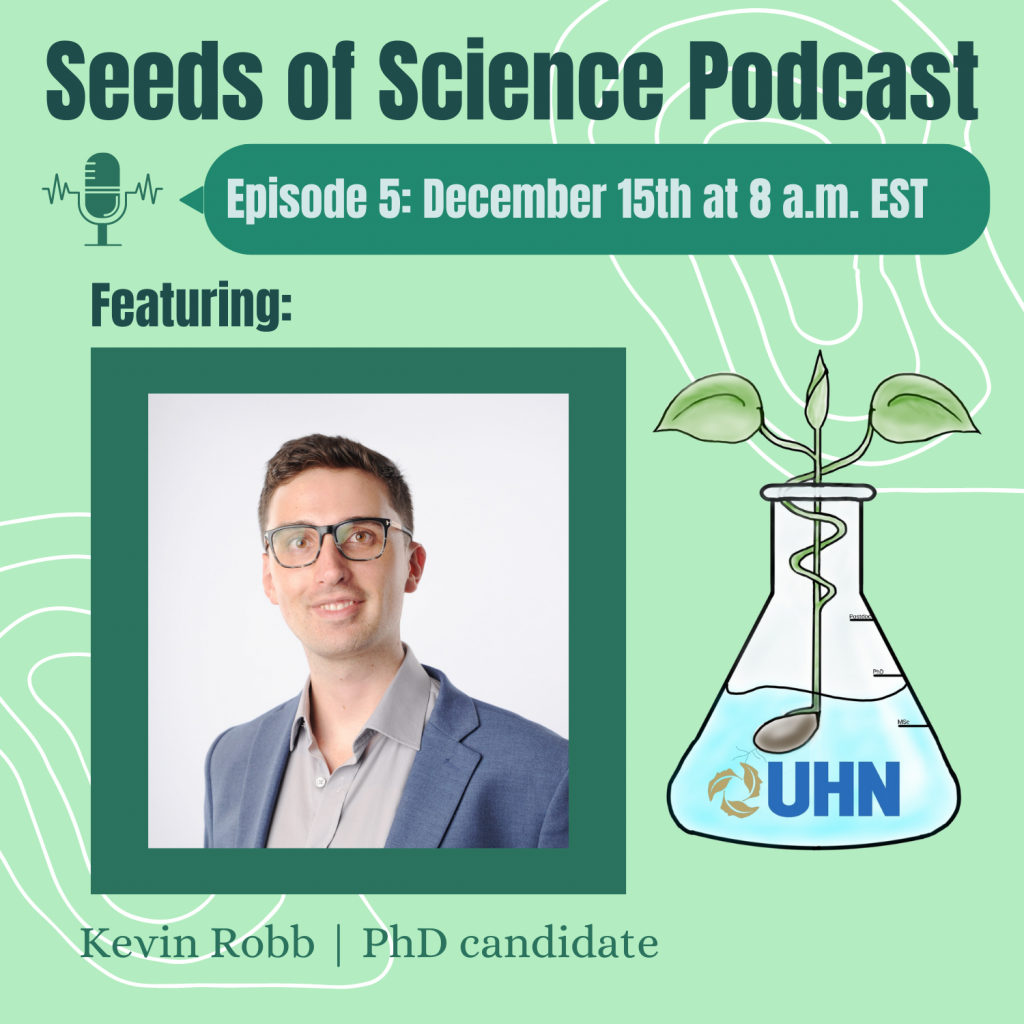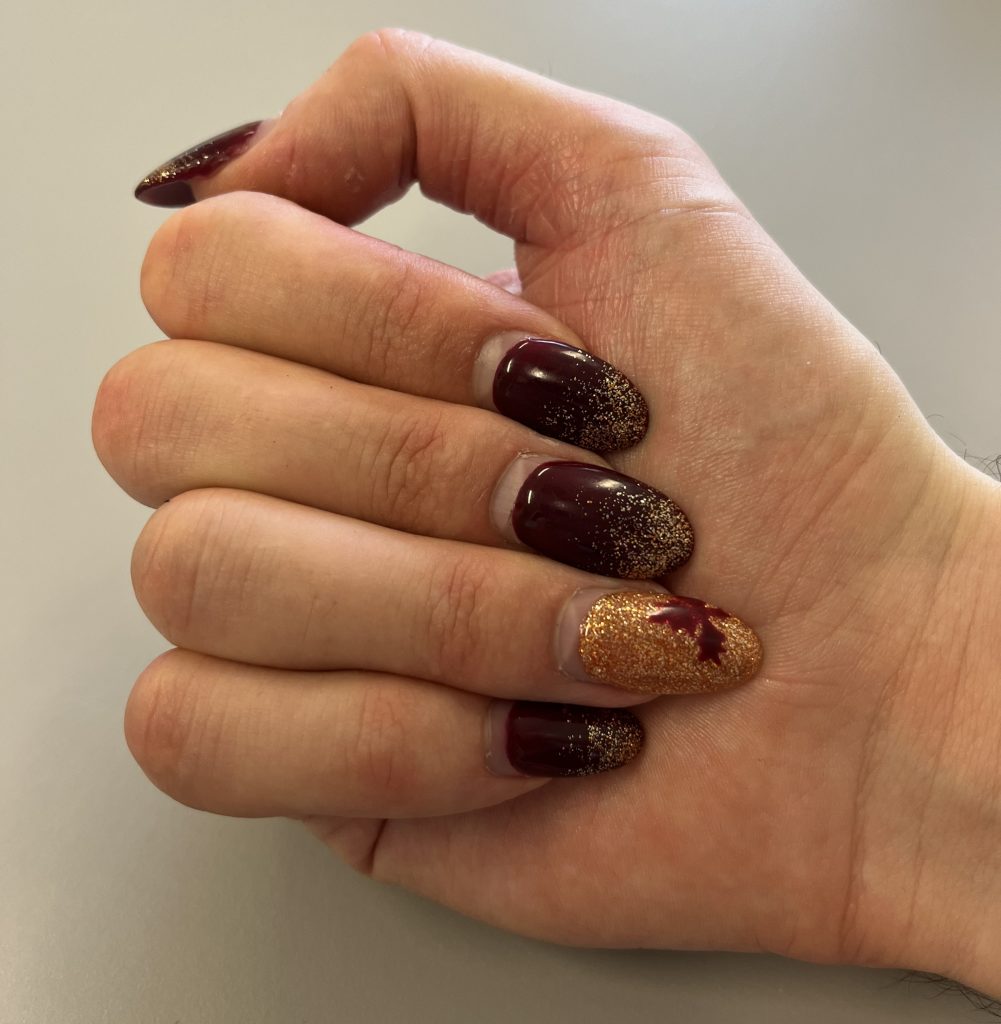Seeds of Science: Episode 5 Kevin Robb

Kevin Robb is a PhD Candidate in Biomedical Engineering at the University of Toronto working under the supervision of Drs. Sowmya Viswanathan and Rajiv Gandhi within the Schroeder Arthritis and Krembil Research Institutes. His PhD thesis is focused on evaluating critical quality attributes and engineering potent mesenchymal stromal cell therapies for osteoarthritis.
Outside of his research, Kevin serves as Vice-Chair of the Stem Cell Network Trainee Communications Committee, is a member of the UHN 2SLGBTQIA+ Committee and Krembil Trainee Affairs Committees, and he contributes to science blogs. He is passionate about teaching and recently co-led the Undergraduate Summer Research Program within the Faculty of Applied Science and Engineering at the University of Toronto. Kevin enjoys distance running, hiking, nail polish, and pampering his cat, Frances.
Pronouns: he/him
Stage of research: PhD Candidate, Year 5
Listen to the episode on:
Kevin’s Fall Nails

Kevin’s Winter Nails

Connect with Kevin:
Mental Health Resources:
More information:
- Papers from Kevin’s PhD research:
- Putative critical quality attribute matrix identifies mesenchymal stromal cells with potent immunomodulatory and angiogenic “fitness” ranges in response to culture process parameters. Access the paper here.
- Mesenchymal stromal cell therapy: progress in manufacturing and assessments of potency. Access the paper here.
- Other links:
- Viswanathan lab website
- Schroeder Arthritis Institute
- Stem Cell Network Trainee Communications Committee.
- UHN 2SLGBTQIA+ Committee SharePoint webpage (link requires UHN credentials). Sign up for the Committee’s mailing list here.
Episode Abbreviations and Definitions:
- Adipose tissue – fat
- Adipocytes – cells found in mature fat
- Angiogenic properties – a substance with angiogenic properties will promote the formation of new blood vessels. Reference here.
- Anti-inflammatory properties – a substance or treatment that reduces inflammation or swelling. Reference here.
- Cell-based therapies – the transplantation of cells to treat diseases or to replace/repair damaged tissues.
- Cell isolation & expansion – the process of isolating one cell population from other cells in a heterogeneous biological sample (isolation); and then passing the cell population from smaller cultures or volumes to larger ones, ultimately arriving at an increased number of usable cells (expansion).
- Cell lineage – developmental history of a tissue or organ.
- Chondrocytes – cells making up mature cartilage.
- CNS – central nervous system (comprising brain and spinal cord).
- Critical quality attributes (CQAs) – A CQA is a physical, chemical, biological, or microbiological property or characteristic that should be within an appropriate limit, range, or distribution to ensure the desired product quality. Reference here.
- Immunomodulatory properties – the ability of a substance to alter the immune system’s cells or the immune response. Reference here.
- In culture – the process by which cells are grown under controlled conditions, generally outside of their natural environment.
- In vitro – Latin for “In glass” – refers to studies that are performed with cells or biological molecules outside their normal biological context, often in a tissue culture dish.
- In vivo – Latin for “In a living thing” – refers to studies that are performed with whole, living organisms.
- Mesenchymal stromal cells (MSCs) – spindle shaped plastic-adherent cells isolated from bone marrow, adipose, and other tissue sources, with multipotent differentiation capacity in vitro (i.e. these cells can transform into several, but not all different cell types). These cells can modulate inflammation and support endogenous tissue regeneration. MSCs are sometimes referred to as mesenchymal “stem” cells but there is controversy over whether they fulfill criteria of true stem cells. Reference here.
- Osteoarthritis – the most common form of arthritis. It occurs most frequently in the hands, hips, and knees and is caused by damage or breakdown of joint cartilage between bones. Reference here.
- Osteocytes – cells found in mature bone.
- Personalized medicine – an emerging practice of medicine in which the specific disease profile or genetic background of an individual is used to customize decisions made in regard to the prevention, diagnosis, and treatment of disease for that individual. Reference here.
- Stem cells – Special cells that can self-renew (i.e. divide and make new stem cells) and differentiate into different cell types. Reference here.
- Therapeutic potency – an expression of the activity of a cell therapy to produce a desirable clinical effect.
- Western – Western University in London, Ontario.
Disclaimer: The Seeds of Science podcast is supported by UHN’s Office of Research Trainees (ORT). The views expressed in the podcast episodes are not necessarily those of UHN or ORT.




